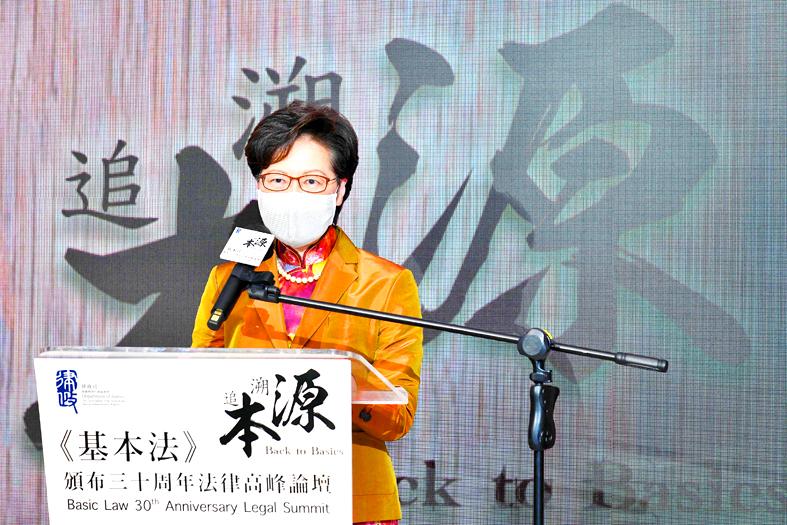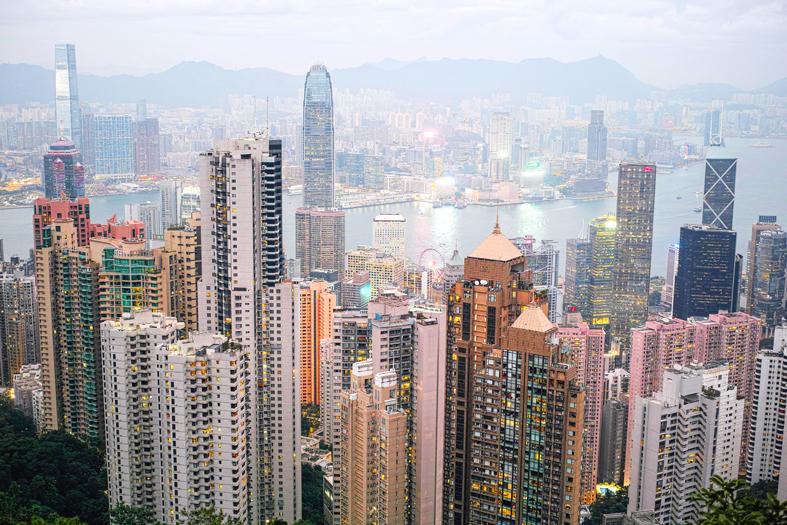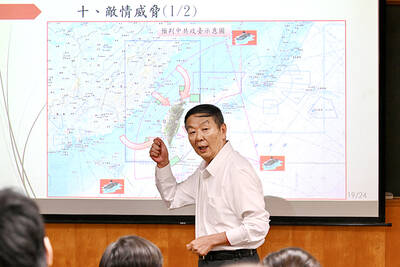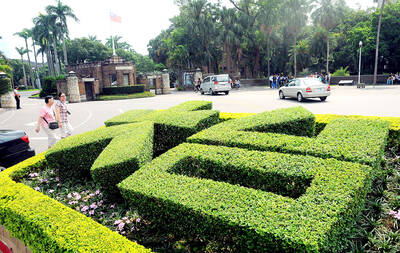A senior Chinese official yesterday said that authorities are working on reforms related to Hong Kong’s mini-constitution, including its judicial system.
Hong Kong and Macau Affairs Office Deputy Director Zhang Xiaoming (張曉明) told a legal summit in the territory that moves to “perfect” the legal system would not undermine judicial independence.
“We need to see the Basic Law as something that is alive so we can interpret the Basic Law whenever necessary,” said Zhang, referring to Hong Kong’s mini-constitution, adding that authorities are looking to push through more “Basic Law-related work.”

Photo: EPA-EFE /Hong Kong Information Services Department
Zhang said that the work was related to “oath optimization” and “qualification screening” for civil servants, national education and judicial reform. He did not elaborate.
Under the territory’s new National Security Law, civil servants are required to pledge allegiance to Hong Kong and the Basic Law.
Zhang said the moves were aimed to correct “wrongful activities” and cover loopholes.

Photo: EPA-EFE
“Right now is time to sort out what is true and what is false,” Zhang said, stating that people who do not recognize the “motherland” or threaten the country’s national security do not fall in line with the Basic Law.
Zhang’s comments come after Beijing passed a resolution last week to empower Hong Kong authorities to disqualify lawmakers deemed a threat to national security without having to go through courts.
Hong Kong then immediately expelled four legislators, prompting opposition pro-democracy lawmakers to resign en masse in protest on Thursday last week.
“Only those who are patriotic should be in place, otherwise they should be removed from the system,” Zhang said.
In related news, Taiwanese and Hong Kong advocates have expressed alarm over reports that China is compiling a global watch list of those who have voiced views deemed separatist, a move that would mark a major escalation in Beijing’s pursuit of its critics.
China is gathering names of prominent advocates of Taiwanese independence, a Beijing-backed newspaper in Hong Kong, the Ta Kung Pao reported earlier this week.
The list could include advocates both in Taiwan and abroad as well as those who helped fund such activities, Ta Kung Pao said, citing officials it did not name.
The newspaper is among the publishing operations controlled by China’s government through its Hong Kong Liaison Office.
Meanwhile, state broadcaster Shenzhen Satellite TV said in a commentary over the weekend that secession was criminalized by the National Security Law, a measure that also covers those advocating Taiwan’s independence.
The legislation includes a controversial provision that applies to non-residents residing overseas.
“They will no longer be able to set foot in Hong Kong, Macau and the Chinese mainland and it will also be very dangerous for them to travel to other countries and regions,” the Chinese tabloid Global Times said on Monday in an editorial. “In short, this list will be a ‘sword of Damocles’ hanging over their heads for a long time to come and they will never know when it will come down.”
Former Hong Kong lawmaker Nathan Law (羅冠聰), 27, who fled to London before the law’s enactment, said the reports showed that Beijing planned to raise the stakes.
“The list will definitely impose a stronger level of white terror and send a threatening signal to those in Hong Kong and in Taiwan that they dare not travel to Hong Kong, China and the other places anymore,” Law said.
Chinese Ministry of Foreign Affairs spokesman Zhao Lijian (趙立堅) yesterday referred questions about the list to the “competent authority,” without elaborating.
“What I can tell you is China is determined to safeguard its national unity and territorial integrity. No separatist attempt will succeed, its only outcome is total failure,” Zhao told reporters.
Premier Su Tseng-chang (蘇貞昌), who the Global Times editorial named as one prominent example of a Taiwanese independence supporter, told reporters in Taipei yesterday that he would “guard the country and protect people without giving in to military force.”
The Mainland Affairs Office said any list would be “counterproductive” and ineffective.
“China’s attempts to intimidate Taiwanese into self-censorship and incite cross-strait confrontation with such extreme agenda, has destroyed cross-strait peace and stability,” it said in a text message to Bloomberg.
Additional reporting by Bloomberg

RETHINK? The defense ministry and Navy Command Headquarters could take over the indigenous submarine project and change its production timeline, a source said Admiral Huang Shu-kuang’s (黃曙光) resignation as head of the Indigenous Submarine Program and as a member of the National Security Council could affect the production of submarines, a source said yesterday. Huang in a statement last night said he had decided to resign due to national security concerns while expressing the hope that it would put a stop to political wrangling that only undermines the advancement of the nation’s defense capabilities. Taiwan People’s Party Legislator Vivian Huang (黃珊珊) yesterday said that the admiral, her older brother, felt it was time for him to step down and that he had completed what he

Taiwan has experienced its most significant improvement in the QS World University Rankings by Subject, data provided on Sunday by international higher education analyst Quacquarelli Symonds (QS) showed. Compared with last year’s edition of the rankings, which measure academic excellence and influence, Taiwanese universities made great improvements in the H Index metric, which evaluates research productivity and its impact, with a notable 30 percent increase overall, QS said. Taiwanese universities also made notable progress in the Citations per Paper metric, which measures the impact of research, achieving a 13 percent increase. Taiwanese universities gained 10 percent in Academic Reputation, but declined 18 percent

UNDER DISCUSSION: The combatant command would integrate fast attack boat and anti-ship missile groups to defend waters closest to the coastline, a source said The military could establish a new combatant command as early as 2026, which would be tasked with defending Taiwan’s territorial waters 24 nautical miles (44.4km) from the nation’s coastline, a source familiar with the matter said yesterday. The new command, which would fall under the Naval Command Headquarters, would be led by a vice admiral and integrate existing fast attack boat and anti-ship missile groups, along with the Naval Maritime Surveillance and Reconnaissance Command, said the source, who asked to remain anonymous. It could be launched by 2026, but details are being discussed and no final timetable has been announced, the source

SHOT IN THE ARM: The new system can be integrated with Avenger and Stinger missiles to bolster regional air defense capabilities, a defense ministry report said Domestically developed Land Sword II (陸射劍二) missiles were successfully launched and hit target drones during a live-fire exercise at the Jiupeng Military Base in Pingtung County yesterday. The missiles, developed by the Chungshan Institute of Science and Technology (CSIST), were originally scheduled to launch on Tuesday last week, after the Tomb Sweeping Day holiday long weekend, but were postponed to yesterday due to weather conditions. Local residents and military enthusiasts gathered outside the base to watch the missile tests, with the first one launching at 9:10am. The Land Sword II system, which is derived from the Sky Sword II (天劍二) series, was turned